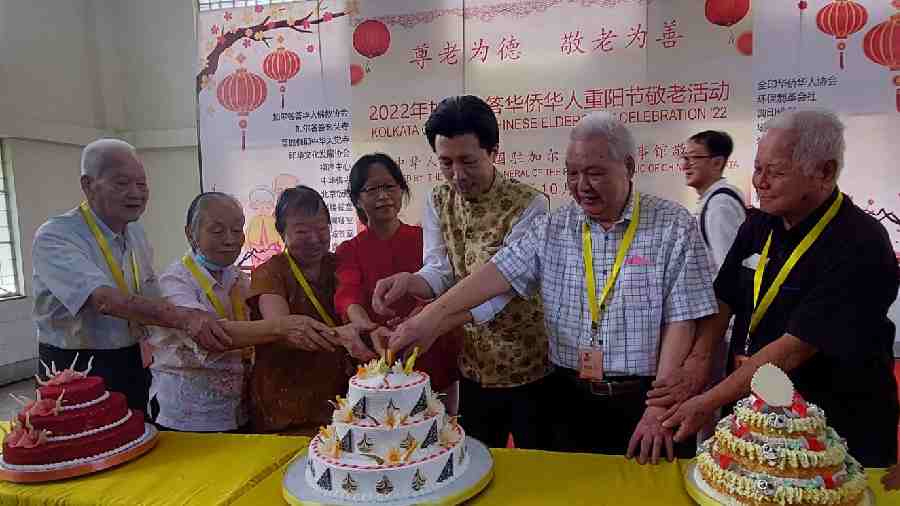About 120 elderly Calcuttans of Chinese origin gathered at the Hsuan Tsang Temple in Tiljala, off the Bypass, on Sunday morning. The occasion was the Chong Yang Elder’s Day festival, which was making a comeback after a gap of two years.
“The ninth day of the ninth month of the Chinese lunar calendar is auspicious for the Chinese. There is a folk custom in China to pray for longevity. The homonym of Nine Nine means health and longevity. The Double Ninth Festival has become the Chinese Respect for the Elders Festival,” said Hui Rong, head abbot of the monastery.
The event was organised by the All India Indian Chinese Association and sponsored by the Chinese consulate general.
“The day has been legalised in China for showing respect to seniors. We have organised this for the community in Calcutta on behalf of their ancestral home. The lunar September 9 fell on October 4 (in the Gregorian calendar). Since Durga Puja was under way then, we shifted the date,” said Zha Liyou, the Chinese consul general.
Kolkata, he added, is the home of the Chinese community in India. “As a small community, they make valuable contribution to the social and economic development in Bengal and play a unique role in bridging the cultures of India and China,” he said.
A table was the centre of attention where five 90-plus people were seated. They cut a cake and were handed special gifts.
The linguistic profiles of the attendees starkly varied across generations. Li Juxiu energetically wrote out her name and age, 92, in Hakka (a Chinese dialect), but no other information could be elicited in Hindi or English beyond a toothless grin.
“My mother does not speak any language other than Hakka. We speak English, Bengali and Hindi, too, but not her generation,” said Cheng Kim Ling, who had brought her mother, 78-year-old Chung Lee Yung, from Tangra. Cheng’s son understands Hakka but does not speak the language.
The oldest surviving member of the community is possibly Lim Yun Chen. The 96-year-old visually challenged woman could not make it. Her 80-year-old son was there.
A lavish lunch was served that included traditional items like mugwort cake. “It is made of sticky rice and traditionally offered to ancestors,” said Bean Ching Law, president of the Chinese Indian Association. “The day was observed for five years before the pandemic struck. We are glad that it has been revived,” he said.
A cultural programme was held, that included a lion dance and a perfomance by two Bengali girls to Durga vandana.
Leong Keen Wah, a retired chef from Bow Barracks, sang “Awaara hoon” and “Kisi ki muskurahaton pe”. Mao Chi Wei, a dentist, made a poignant choice. Singing the first stanza of the Mukesh song “Chodo kal ki baatey”, he ended with the refrain “Hum Hindustani”.
